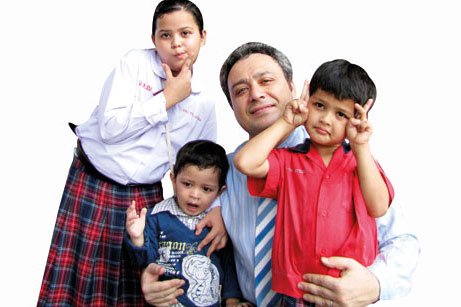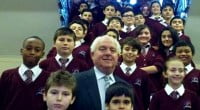Turkish Olympiads built on legacy of linguistic, cultural interaction

Date posted: June 24, 2011
MESUT ÇEVİKALP, İSTANBUL
Some 1,000 students from 130 countries have come to Turkey to attend the Ninth International Turkish Olympics. Students from different cultures are bringing their poems, songs and folk dances to the Turkish language festival.
This year’s Olympiads, themed after Yunus Emre’s famous call, “Come and let’s get acquainted,” are much more colorful. In line with this year’s theme, students are expected to promote their own culture along with Turkish language and culture.
Tuncay Öztürk, the secretary-general of the International Turkish Education Association (TÜRKÇEDER), the association that organizes the Turkish Olympiads, notes that that they have given priority to activities that promote cultural exchange. “This year, we tried to ensure that students would reflect the culture of their own countries. Indeed, there is a cultural exchange. While they are learning about us, we will also learn about their cultures,” he says.
In fact, this has always been the goal of volunteers of education. While promoting Turkish language and culture, they have brought foreign cultures to Turkey. After marrying local people, some of them have settled in the foreign countries, moved to other countries or returned to Anatolia. They have taught the Turkish language and learned the languages of their students.
On the occasion of the Ninth International Turkish Olympics, this aspect of cultural and linguistic exchange has become clearer. The teachers who made this possible have undergone a challenging process of mastering the local languages in the countries in which they worked. Some teachers attended language courses, some took private lessons and others learned these languages by talking with local people and studying grammar books. Their primary supporters were always their students, and they learned a new language in two years. They had difficulties in learning Asian languages with their complex scripts and intensive intonations in particular, but they never gave up and most of them managed to speak their foreign languages, albeit with slight accents. Naturally, teachers who married local people learned the local language more quickly.
A new language every 90 kilometers
Mehmet Ali Şeker is one of those teachers who learned his third language in the streets. He graduated from Muğla University’s department of biology in 2002. The same year he received a job offer abroad and quickly accepted. He was the first Turkish teacher to go to Bombay. Being a science teacher, Şeker found it hard to learn the Hindi and Urdu languages. Since he knew English, he could communicate with Indians, but realizing that he should learn the Hindi language in order to love India and its people, he started to study Hindi. “English is very common in India, but you have to speak Hindi in order to become one of them,” he says.
Although Şeker, from Gaziantep, went through some difficulties in learning a foreign language, his wife Tuğba and his son, Mustafa Sami, who was born in Bombay, were relatively comfortable. Tuğba learned Urdu through interaction with her neighbors while Sami learned it from his Indian friends in the streets.
Şeker complains about his inability to speak Urdu perfectly. “There are more than 300 local languages in this country, and they are all mixed up. There is a famous Indian proverb: ‘In India, the language changes every 90 kilometers.’ Therefore, there is much to be done,” he says.
Learning a language on the streets
Bünyamin Çobanlı, from Kahramanmaraş, learned three foreign languages, all in the streets. He learned Thai and English in Thailand, where he attended university in 2001. After graduating from the university in 2007, he started to work at a Turkish school in Laos. He learned his third foreign language, Lao, in Laos. His wife who is a biology teacher working at the same school also learned the local language. “I learned English at Payap University in Thailand. I learned Thai and Lao by communicating with local people, as well as from grammar books,” he says.
Like Şeker, Çobanlı had hard time learning intonation. “When you attach importance to them and learn their language and culture, they become enthusiastic about learning your language and culture. The most important thing for me is to learn the local language, this helps me love the country. You cannot work efficiently in a country you don’t like,” he says.
Writing a Swahili dictionary
Muhammet Azad Boztaş, the head of the Turkish language community at the Turkish school in Egypt, can speak four languages, having learned them all while he was teaching Turkish. He did this happily. “I taught Turkish to my students who in turn taught me their languages. For instance, we translated the songs in local languages to Turkish and sang them in both languages. We even got a silver medal for our one of our translated songs at the Eighth International Turkish Olympiads,” he says.
Boztaş learned Kurdish as his first foreign language during his university years. In 2004, he started to work at a Turkish school in Tanzania, where he stayed for four years, learning English and Swahili. He finally learned Arabic in Egypt, where he has lived for the past two years. He taught English and Arabic to his wife. “Learning the local language is actually a big step toward earning the hearts of people of that country. It is the key to establishing dialogue with local people, I believe,” he says. He also wrote a Turkish-Swahili dictionary. “When I was in Tanzania, I prepared a Turkish-Swahili dictionary and an introductory manual for Swahili. This has proved to be a unique resource for Turkish businessmen and tourists. Knowing a few words in the local languages will increase your sense of safety in Tanzania,” he says.
Word games
Learning a language from local students may sometimes put you into an awkward situation. This is exactly what happened to Ahmet Yiğit, a teacher of literature from the Erciş district of Van. “When I went to Mongolia for the first time, I asked for the Mongolian equivalent of ‘be quick.’ A cheeky student told me a Mongolian word that actually means ‘I love you.’ I continued to tell the students who were late, ‘I love you,’ instead of ‘be quick’ until I learned the true meaning of the word,” he recounts.
Yiğit has been working at a Turkish school in Mongolia since 2005. He and his wife have learned Mongolian through interaction with locals and students. Yiğit can also speak Kazakh. “I realized that every new language I learn expands my vision. It not only facilitates my life, but also helps me see things from different perspectives. It makes you understand that the world is not restricted to your small world and encourages you to go beyond your own limits,” he explains.
Kadir Parlar, an English teacher who has been working at Turkish schools in Japan since 2001, learned Japanese by attending a nine-month course. Since marrying a Japanese woman, his Japanese has become quite impressive. He taught Turkish to his wife, who taught him and their three kids Japanese. “You learn the language of the country you are in and you start to perceive and understand its culture, customs and traditions,” he says.
Aegean accent proved useful
Engin Öztürk, from Denizli, in 1997 went to Thailand, where he earned his second degree, and has been working as a teacher at Turkish schools there for 11 years. He learned German while in high school and English and Thai at university. He married Thai Weena (Rana) in 2001 and he has perfected his Thai thanks to this marriage. He even worked as a certified Turkish-Thai interpreter in court. In learning Thai intonation, he has benefited greatly from his Aegean accent. “Thai has five different intonations, which give the same word five different meanings. It takes time and effort to perceive and master these intonations. Interestingly, my Aegean accent proved a big advantage for me. In the Aegean region, we use a very nasal ‘n’ in pronunciation. It is a sound between ‘n’ and ‘g.’ There is a similar sound in Thai, and it is very hard to produce. Many foreigners who learn Thai are unable to master this sound,” he says.
Öztürk is currently learning Burmese and Arabic and is particularly curious about learning new languages. Starting with curiosity, he has learned new languages and perfected them with frequent use. “One should not be afraid of making mistakes. Perseverance is the key to learning a new language. I have never seen anyone who has failed to learn a new language if he has studied with perseverance,” he says.
Being mistaken for a local
Knowing the local language may sometimes prove disadvantageous. This is what happened to Öztürk in Thailand. “It is both a great pleasure and a necessity to be able to talk to Thai people in their language, but it may also become disadvantageous. Once we were traveling with a friend of mine who was in another car just ahead of us and of us started to speed without realizing it. The Thai police stopped us. They could not communicate with my friend, so he escaped the fine, but I talked to them in Thai and I got fined.”
His wife Weena has mastered her Turkish thanks to her husband. She worked as a teacher at the kindergarten of a Turkish school. She thinks that Turkish is harder to learn than Thai. “We supported each other in terms of learning a foreign language. I taught Thai to Engin, who taught me Turkish. Both languages are spoken at home,” she says.
Turkish from Maraş to Laos
Mangundayao (Sueda), a teacher form the Eastern Star College in Laos, has another interesting story. She is a Filipino kindergarten teacher who came to Turkey in 2003 to work at a private high school in Kahramanmaraş. She worked first in Kahramanmaraş and then in Gaziantep. While working in Kahramanmaraş, she met Engin Yaşmun, the director of a Turkish school in Laos. They got married in 2007 and returned to Laos.
She perfected her Turkish with the support of her husband and started to study Lao. “I knew six languages before I came to Laos. I started to learn the seventh here. Since I don’t have time to attend a course, I try to learn Lao by establishing dialogue with people and reading or listening to news stories. My husband, Engin, is more proficient in Lao and he helps me a lot. I am happy to be able to speak Turkish with my husband. I would like to teach my kids Turkish and Filipino,” she says.
Ramazan Göktürk, from Malatya, learned Russian and English at university and is now studying Vietnamese, a language that employs six different kinds of intonation. “It is my duty to learn it,” he says. Göktürk, who has been working as a physics teacher at Turkish schools in Vietnam since 2005, underlines that he is learning Vietnamese in order to better teach his students. Inspired by him, his wife Dilek has learned English and started to study Vietnamese.
What is the use of learning a little-known language in Turkey? “One would answer, ‘Nothing,’ some 10 years ago, but today things have changed considerably,” says Musa Ömür, a math teacher who graduated from Boğaziçi University in 2001. The same year he started to work at the Turkish schools in Indonesia. He returned to Turkey in 2008. Back in Turkey, the Indonesian he learned in Jakarta opened the door to an unexpected job offer. “I never thought that my Indonesian would provide me with job opportunities. I received a good offer from Social and Economic Cooperation with Pacific Countries Organization [PASİAD], and I accepted it,” he says.
Source: Today's Zaman , 20 June 2011
Tags: Hizmet-inspired schools | Turkish Olympiads |
























